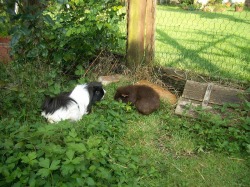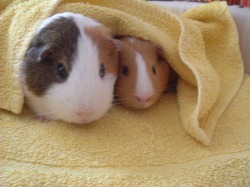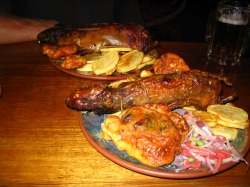Behavior
Guinea pigs can learn complex paths to food, and can accurately remember a learned path for months. Their strongest problem solving strategy is motion. Guinea pigs tend to be shy, they like to know that they are safe, they will try and find cover where they feel safe or where they can't see you. Guinea pigs sometimes make a loud kind of whisle noise, the name of which is onomatopoeic, also known as a whisle. An expression of general excitement, it may occur in response to the presence of its owner or to feeding. It is sometimes used to find other guinea pigs if they are running. If a guinea pig is lost, it may wheek for assistance. Guinea pigs can jump small obstacles, they cannot climb, and are not particularly agile. They startle extremely easily, and will either freeze in place for long periods or run for cover with rapid, darting motions when they sense danger. Larger groups of guinea pigs who startled will stampede.
Natural Habitat

There are two different types of guinea pigs, wild guinea pigs and non wild guinea pigs. You usally find guinea pigs on patches of grass because they eat a lot of it. They move together in small groups (herds). guinea pigs are quite social aniamls. Groups consist of several females (sows), a male (boar), and the young (which in a break with the preceding porcine nomenclature are called pups). They mainly eat grass or other vegetation and they can not store food. They do not burrow or build nests, they frequently seek shelter in the burrows of other animals, as well as in crevices and tunnels formed by vegetation. They are crepuscular, tending to be most active during dawn and dusk, when it is harder for predators to spot them.
Diet
Grass is guinea pigs natural diet. Their molars are particularly suited for grinding plant matter, and grow continuously throughout the animal's life this is why you should put an unvanished piece of wood in their cage for them to chew on so there teeth won't grow to long. You should always have a supply of guinea pig food so they keep a healthy diet because guinea pig food has everything they need in it. Guinea pigs eat there own hay because hay is just dryed up grass and they eat grass. Vitamin C is very important in there diet, if they do not take enogh vitamin c then they can suffer from potentially fatal scurvy. Guinea pigs require about 10 mg (0.15 gr) of vitamin C daily (20 mg (0.31 gr) if pregnant), which can be obtained through fresh, raw fruits and vegetables (such as apple, cabbage, carrot, celery, and spinach) or through dietary supplements. they usally eat there own poo, this might sound quite disgusting but it's quite normal for them. They do not respond well to sudden changes in diet; they may stop eating and starve rather than accepting new food types. A constant supply of hay or other food is generally recommended, as guinea pigs feed continuously and may develop habits such as chewing on their own hair if food is not present.
Pets

If handled correctly early in their life, guinea pigs become amenable to being picked up and carried, and seldom bite or scratch. Guinea pigs love their cage because it's a safe place and will rarly try to exscape from it even if you left the cage open. Sometimes, once they are used to their owner they will whistle to the sound of plastic bags or fridge opening because they know that they are going to get something to eat. There are lots od different breeds of guinea pigs, these vary in hair and color composition. The most common varieties found in pet stores are the English shorthair (also known as the American), which have a short, smooth coat, and the Abyssinian, whose coat is ruffled with cowlicks, or rosettes.
Health
Common ailments in domestic guinea pigs include respiratory, infections, diarrhea, scurvy (vitamin C deficiency, typically characterized by sluggishness), abscesses due to infection (often in the neck, due to hay embedded in the throat, or from external scratches), and infections by lice, mites or fungus, Guinea pigs are very good at hiding diseases. If they have not eaten for over 12 hours then this usally means that they are not well, you should take your
guinea pig to a vet to get he or she shecked to amek sure that he or she is ok.Foreign bodies, especially small pieces of hay or straw, can become lodged in the eyes of guinea pigs, resulting in excessive blinking, tearing, and in some cases an opaque film over the eye due to corneal ulcer. The ideal tempurture for them is 65–75 °F (18–24 °C), simlar to humans.
Breeding
The guinea pig is able to breed year-round, with birth peaks usually coming in the spring; as many as five litters can be produced per year. The gestation period lasts from 59–72 days, with an average of 63–68 days. When guinea pigs are born they unlike humans they are already mobile, they can walk, eat solids and drink. They are born with claws, teeth and fur. Guinea pigs are born in groups 1 - 6 with an averge of 3.
Guinea Pigs as Food

Guinea pigs used to be used mainly for food, they still eat guinea pig in some countrys but now people mainly keep them as pets. Traditionally, the animal was usually reserved for ceremonial meals by indigenous people in the Andean highlands, but since the 1960s it has become more socially acceptable for consumption by all people. It used to a major part of the diet in Puru and Bolivia. it was also eaten in Ecudor and Columbia. Peruvians ate an estimated 65 million guinea pigs each year.
